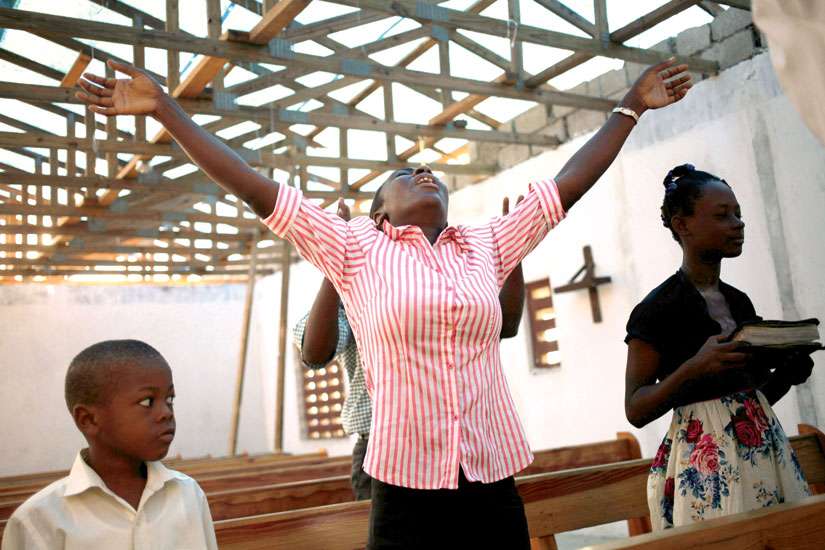The United Nations believes there are 1.4 million Haitians affected by the Oct. 4 hurricane who need clean water, sanitation and hygiene supplies. An estimated 350,000 people are in immediate need and over 21,000 are in temporary shelters, Development and Peace international programs officer for Latin America Mary Durran told The Catholic Register.
The numbers of dead, homeless and hungry aren’t half the story for Fr. Jean Marie Beaublanc, pastor to the Haitian community in Toronto.
Marking his first year in Canada, Beaublanc is on tenterhooks waiting for news from his home in the south of Haiti.
All he knows is that his home town of Jeremie is devastated. At least 80 per cent of the buildings in the city of 31,000 have been damaged — including the cathedral where Beaublanc was baptized, ordained and served his bishop as vicar. The Cathedral of St. Louis de France in Jeremie now has no roof.
“It was a beautiful cathedral,” said Beaublanc.
It’s hard for Beaublanc to imagine how the four dioceses in the southern half of Haiti are going to recover.
“All the dioceses in Haiti are very poor — all the provinces. It’s a very poor country. It’s difficult. Now we need support from international organizations, every kind of support,” Beaublanc said.
Development and Peace has had a major commitment to Haiti for the last 50 years, which was only amplified in response to the 2010 earthquake and the 2011 outbreak of cholera. Canadians donated more than $20 million to Development and Peace for earthquake recovery and rebuilding. The organization used it to help Haitians build earthquake-proof housing, start new agriculture programs, protect women and girls from sexual violence and fight cholera.
The 400 homes built in the earthquake recovery program have stood the test with only minor damage, Durran said.
Henhouses that were part of the agriculture projects are also still standing.
“They’re still up and they’re intact. They’re a symbol of hope at the moment. That’s how we carry on,” said Durran.
However, gardens planted by women’s organizations that Development and Peace funds have been washed away. Vegetables that women were counting on to feed their families and sell in the marketplace are gone and the danger now is hunger.
“People were already in a very difficult and fragile situation, but now with the loss of the nurseries people are facing acute hunger,” said Durran.
Canadian Foodgrains Bank is waiting to hear from its ecumenical Church partners, including Development and Peace, to see what kind of food and agricultural aid might be necessary, said Foodgrains spokesperson John Longhurst.
On the cholera front, where the disease has killed over 10,000 in the last five years, the battle continues.
“A response to cholera could well be part of our humanitarian interventions,” said Durran.
As one of the organizations with a long history in Haiti, Development and Peace has been invited to submit proposals for humanitarian assistance this week to Global Affairs Canada. Foreign Affairs Minister Stéphane Dion announced an initial $3.8 million fund for Hurricane Matthew-affected areas. Most of the money will go directly to United Nations agencies. On Oct. 6 $780,000 went to Canadian organizations that specialize in disaster response, including the Canadian Red Cross, Save the Children Canada and Oxfam Canada.
The government has also sent the Canadian Disaster Assessment Team to Haiti.
Ultimately it will be Haitians who rebuild Haiti one more time, but with the help of those willing to work with them, said Durran.
“We’re very committed to working with Haitian organizations,” she said. “For us, that’s really the key to working in Haiti, that you work through Haitian organizations. You don’t just parachute in foreigners.”


